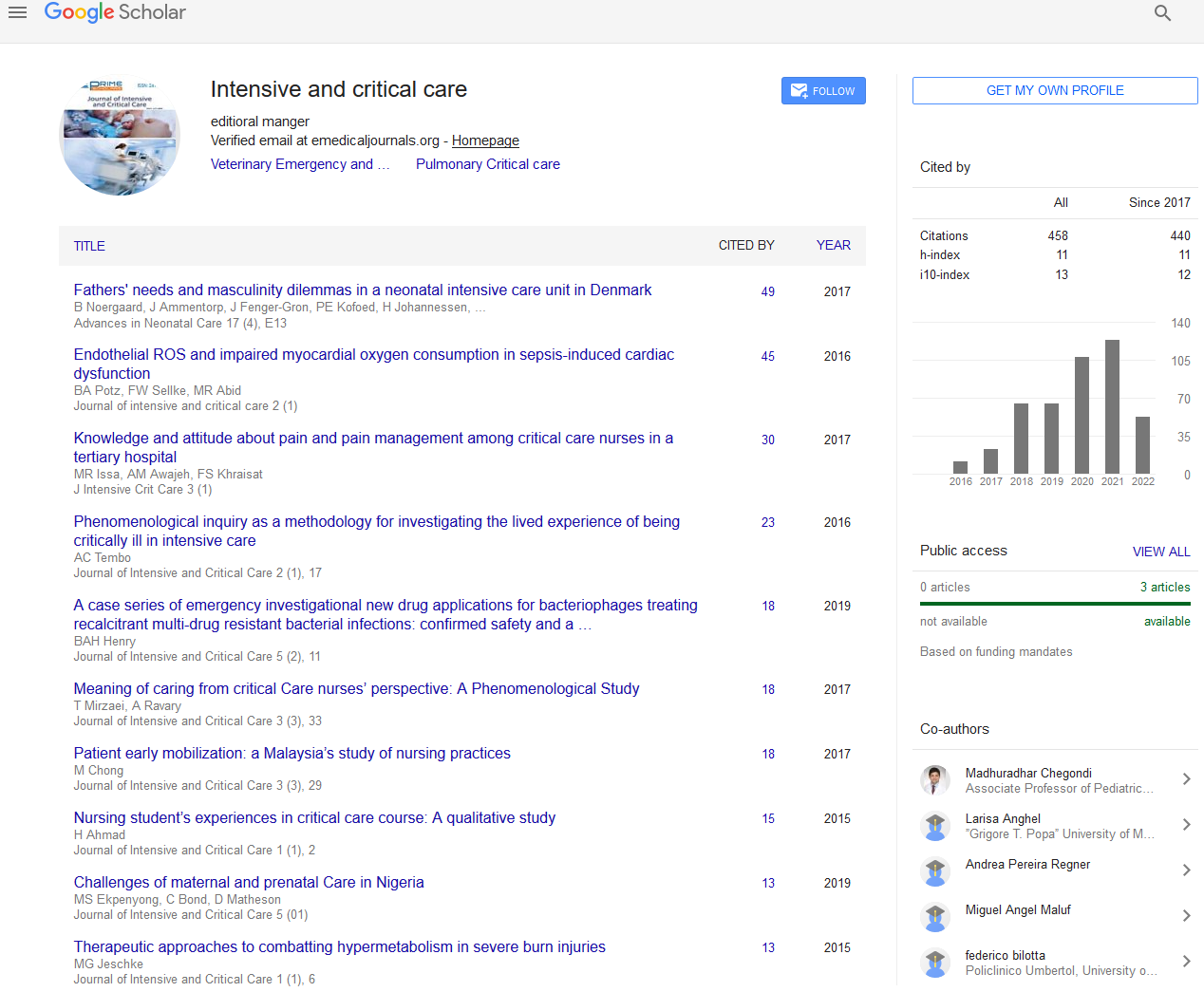Commentary - (2024) Volume 10, Issue 6
Artificial Intelligence in Critical Care: Applications, Challenges, and Ethical Considerations
Gabriel Costa*
Department of Anaesthesia, University of Kwazulu Natal, South Africa
*Correspondence:
Gabriel Costa,
Department of Anaesthesia, University of Kwazulu Natal,
South Africa,
Email:
Received: 02-Dec-2024, Manuscript No. IPJICC-24-22316;
Editor assigned: 04-Dec-2024, Pre QC No. IPJICC-24-22316 (PQ);
Reviewed: 18-Dec-2024, QC No. IPJICC-24-22316;
Revised: 23-Dec-2024, Manuscript No. IPJICC-24-22316 (R);
Published:
30-Dec-2024, DOI: 10.35248/2471-8505-10.6.52
Description
The integration of Artificial Intelligence (AI) in critical care is
transforming the way healthcare is delivered in Intensive
Care Units (ICUs). By harnessing vast amounts of patient
data, AI systems are enabling earlier diagnoses, personalized
treatments, and more efficient workflows. However, alongside
its immense potential, the adoption of AI brings significant
challenges and ethical considerations that must be carefully
addressed. AI has demonstrated promising applications in
various aspects of critical care. AI models can predict clinical
outcomes by analysing patterns in patient data. For instance,
machine learning algorithms are being used to identify
patients at risk of sepsis, acute respiratory distress syndrome
or acute kidney injury hours before clinical signs appear. These
tools empower clinicians to implement early interventions,
potentially improving survival rates. AI-driven systems
assist intensivists in making critical decisions by providing
evidence-based recommendations. Tools like IBM Watson and
DeepMind Health analyse patient data, medical literature, and
clinical guidelines to offer insights for complex scenarios, such
as ventilator settings or drug dosages. AI has revolutionized
imaging analysis in critical care, enabling faster and more
accurate interpretation of radiological studies. For example,
algorithms can detect lung infiltrates, brain haemorrhages, or
pulmonary embolisms on CT scans with precision comparable
to experienced radiologists. AI can streamline ICU workflows
by automating routine tasks like patient monitoring, alarm
management, and resource allocation. Natural language
processing tools can analyse electronic health records to
identify critical information, saving clinicians valuable time. AIpowered
telemedicine platforms allow real-time monitoring of
patients in remote or resource-limited settings. These systems
use predictive analytics to alert clinicians about deteriorating
patients, bridging gaps in critical care delivery. Despite its
potential, the implementation of AI in critical care is fraught
with challenges. AI models rely on high-quality, standardized
data. However, ICU data is often fragmented, incomplete, and
heterogeneous, making integration into AI systems difficult.
Variations in systems across institutions further complicate
data sharing and model training. While many AI tools show
promise in research settings, their real-world efficacy and
safety remain underexplored. Ensuring rigorous validation
and regulatory approval is essential before deploying AI in
clinical practice. There is a risk of clinicians over-relying on
AI tools, potentially leading to complacency and reduced
critical thinking. AI should complement, not replace, clinical
judgment. Developing, deploying, and maintaining AI systems
requires substantial financial and technical resources. For
many healthcare facilities, particularly in low income countries,
these costs can be prohibitive. The use of AI in critical care
raises several ethical issues. AI systems require large datasets,
raising concerns about the security and confidentiality of
patient information. Ensuring compliance with data protection
regulations is paramount. AI models may inherit biases present
in training data, potentially leading to inequities in care. For
example, algorithms trained on data from predominantly highincome
settings may underperform in diverse or resource
limited environments. Many AI systems operate as black boxes
making it difficult for clinicians to understand how decisions are
made. Ensuring transparency in AI decision making is crucial for
maintaining trust and accountability.
Acknowledgement
None.
Conflict Of Interest
The authorâ??s declared that they have no conflict of interest.
Citation: Costa G (2024) Artificial Intelligence in Critical Care: Applications, Challenges, and Ethical Considerations. J Intensive Crit Care. 10:52.
Copyright: © 2024 Costa G. This is an open-access article distributed under the terms of the Creative Commons Attribution License, which permits unrestricted use, distribution, and reproduction in any medium, provided the original author and source are credited.

